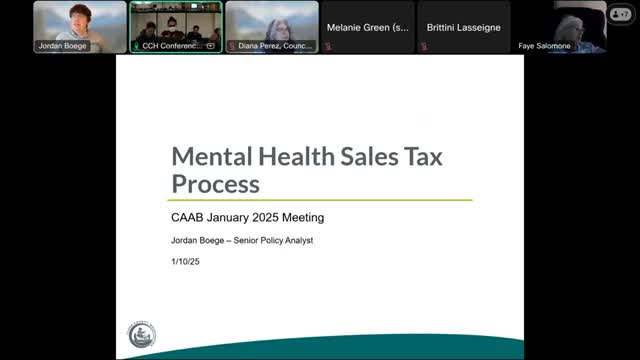Clark County staff describe mental health sales tax process; advisory board did not recommend funding for Vancouver bridge shelter in 2025 cycle
Get AI-powered insights, summaries, and transcripts
Subscribe
Summary
County staff walked the Community Action Advisory Board through the mental health sales tax RFP process, the fund’s purpose and timeline, and explained why the City of Vancouver’s bridge shelter application was not recommended by the advisory board in the 2025 cycle.
Clark County staff provided a detailed briefing on the county’s mental health sales tax funding process and the advisory board review timeline, and said the board did not recommend the City of Vancouver’s bridge shelter application in this funding cycle because the application lacked sufficient operational detail.
Jordan Bogie, senior policy analyst supporting the county council and manager’s office, told the Community Action Advisory Board the sales tax — commonly called the mental health sales tax — is authorized by the state and administered locally under the requirements of RCW 82.14.460. The tax is a one-tenth percent (0.1%) countywide sales-and-use tax that can fund “new and expanded” mental-health, chemical-dependency and therapeutic-court services and certain capital needs that support those services.
Bogie said the county uses the sales tax for both internal government programs (public health, courts, jail treatment services and other county operations) and through an annual external RFP process that typically funds three-year pilot or expansion projects to seed programs and build capacity. For 2025 the county received about 25 external proposals requesting roughly $40 million; the board had about $15 million available in that granting round.
On the City of Vancouver’s bridge shelter request, Bogie said Vancouver originally requested approximately $26 million over 10 years (including about $6 million in initial capital) but later narrowed the ask to three years of operating support for 2025–2027. The county’s mental health sales tax advisory board reviewed the application during the RFP process and did not recommend funding the shelter in the 2025 budget cycle. Bogie said the board’s deliberations reflected a combination of the large number of competing requests and that, in the board’s view, Vancouver’s application did not yet include sufficient detail on how much of the requested funds would be used directly for allowable mental-health treatment services versus other operating costs.
Bogie emphasized Vancouver may reapply in future cycles and that the county welcomed further collaboration; he also noted the county was still working to determine long-term strategy once fund balances are exhausted and that about $4 million will roll into the 2026 process.
Why it matters: The mental health sales tax is a significant county funding stream used to seed and expand behavioral health and related services. The advisory board’s recommendation carries weight in the county council’s budget process and affects whether large, multi-year projects obtain county support.
Details and timeline: The county publishes an annual RFP in June, holds bidder conferences in July, closes applications in mid-August, completes initial scores and group review in September, conducts interviews in early October, and forwards recommendations to the county council for inclusion in the December budget. Contracts for approved projects are typically executed to begin funding on Jan. 1 of the following year.
Bogie directed board members to the Clark County Council webpage that hosts mental health sales tax advisory board materials and annual reports. He repeated the county’s encouragement that applicants needing additional operational detail use the intervening months to strengthen future submissions.
Direct quote: “There was a lot of need and the board felt that the city was still putting together the pieces of what the operation of the bridge shelter would look like,” Jordan Bogie said, describing the advisory board’s view that more operational specificity was needed to meet fund requirements.
What’s next: The county will include its recommended allocations in the budget process; Vancouver may reapply in the 2026 cycle and staff said an estimated $4 million remained in fund balance to carry forward.
